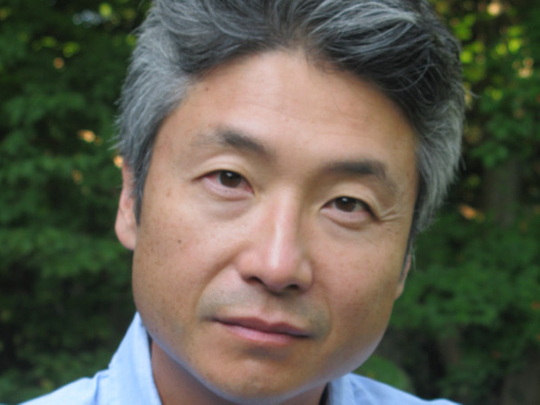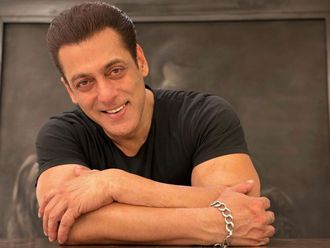
Chang-rae Lee was on a research trip to China, looking around a factory he imagined he might write about. He intended a piece of social realism — a novel about Chinese manual workers, along the lines of Zola’s “Germinal”. “The place itself was like a run-down prep school,” he says. “It had everything that they needed, but nothing more. And so they’re accepting that monotony — hours, rules, regulations — for something greater.” The set-up engendered, he thought, not just a code of conduct in the workers, but “almost a code of psyche, and that’s really what got me”.
The novel Lee ended up writing wasn’t the one he had planned. After returning to America, where he lives — he teaches creative writing at Princeton — the whole enterprise struck the 48-year-old as misguided.
“I thought, why am I bothering? There’s all this great journalism about China these days.” Instead, what germinated was an idea of the future: a dystopian novel set in America, where the descendants of immigrant Chinese workers occupy the safe, closed and relentlessly monotonous society of the kept worker class, exchanging liberty for security in a system permitting no upward advancement. The town they live in is called B-Mor, an iteration of Baltimore, after its native inhabitants have cleared out, and they work as intensive fish farmers until they die, young, of new diseases. “Our tainted world looms within us, every one,” Lee writes, and admits that he was, at times, baffled by the direction of his own work. “When people asked, I’d say, I’m writing a very strange book. I thought, no one is going to get this book.”
Much of this has to do with the unconventional heroine. “On Such a Full Sea” (the title comes from “Julius Caesar”: “On such a full sea are we now afloat; / And we must take the current when it serves, / Or lose our ventures”) is driven by the adventures of Fan, aged 16, who leaves B-Mor to take her chances in the unpoliced “counties” outside the industrial sector. There is nothing cute about Fan; she doesn’t say funny things or run an interior monologue. She doesn’t say much at all; rather, she moves around the story as unself-consciously as water.
“I meant her to be the focus of our attention, the central character,” says Lee, “but not necessarily the central consciousness. She’s not that sort of hero: she’s not loquacious, she’s not philosophical; she is more elemental. She’s there, she persists. And that’s the sort of person I wanted her to be.”
Lee smiles. He is not overly loquacious himself. Fan is, perversely, more attractive a heroine precisely because of these things, and to maintain a space around her, Lee tells the story not from her point of view but from the perspective of the people she left behind. It is a first-person plural that contributes to the sense of her journey as mythic and was necessary, says Lee, to establish “the ways in which these folks in the dystopia need to create stories for themselves. It’s the only way they can break out of their circumstance.”
The tone of the narration is muted, like a held breath — Fan, before her departure, was a diver in the fish tanks, capable of extraordinary feats of free diving, which, writes Lee, left her exhausted “not by the work or holding her breath but instead from the strange exertion of pushing against the emptiness”. The ellipsis of those moments in the tank seems to hang over the novel as a whole; it has the quality of something held finely but perilously in balance. It also, like the best novels, leaves a great deal unsaid. When Fan leaves B-Mor, it is ostensibly to find her missing boyfriend, but she is also propelled by a less distinct yearning, for something the factory town makes no allowance for: the sublime.
“On Such a Full Sea” is, at heart, a romantic novel, but with so few adornments that Lee had to hold his nerve writing it, particularly when it came to Fan. “All the things that we have now are about revealing private moments of consciousness, and sharing them with each other. A constantly defining and redefining of each other and ourselves by all this stuff. And it’s exhausting. And the thought experiment for me artistically was: could I write a story in which the main character had none of that stuff? But you’d still feel something for her, and care about her, if you didn’t really know her. And what was that? That seems to me elementally what a hero is. It’s not because we know them so well. They’re magnetic. It’s a different kind of charisma.”
The fascinating thing about “On Such a Full Sea” is that, for all its adventure narrative, it is underpinned by a solid and shrewd reading of present-day American economics. It is a novel of its time, caught up in recessionary politics and what happens when social mobility, except for a lucky few, effectively grinds to a halt.
Lee grew up in Westchester, a posh suburb of New York that, in the book, is represented by the “Charter villages”, the highly secure zones where rich people live and work, unless they lose their place in the pecking order and are chucked out into the wilderness. Lee’s parents, a psychiatrist and a homemaker, were immigrants from Korea, which gave him, he says, some perspective on the privilege of his upbringing.
“Even though I went to Exeter and Yale, and I enjoyed all the trappings of those places, I think at the same time — and maybe it’s because I’m an immigrant kid and not white — there was always this other consciousness; that is, I was conscious of everything that was going on. And I was observing. Some people just ARE, because the temperature of the water is exactly the temperature of their body.” He laughs. “But my temperature is always off, a little bit. And I have to note it. And I always did, from a very young age. I don’t know if that’s my character or upbringing or both.”
Like the residents of B-Mor, who find themselves making small, meaningless gestures of revolt, as a child Lee could never quite stop himself from upending things. “I felt something creative. I remember when I was in art classes I hated following the assignments. And I would get in trouble for doing something totally different, or taking it in a weird direction. I didn’t think it through or anything, it was just this impulse. I felt like I was never going to quite fit in terms of following rules. And I’d been taught my whole life to follow rules. And to a great extent did. But the last 5 per cent I always wanted to ruin everything.”
Lee felt under pressure from his parents to get a conventional job after college, and so, against his better judgment, went into finance. Exactly a year to the day after he joined a Wall Street firm as an analyst, he quit. “My parents — my mother particularly — were very focused on our succeeding. I loved my parents, and was very grateful to them for everything, and I didn’t want to disappoint them. But I knew it wasn’t going to be my passion. I quite enjoyed making some money. But I could tell that others had a passion for it that I would only be straining to manufacture ... So I got out when I was 22. I thought, if I fail at writing, I can go back at 27.”
He had some money saved, and his parents helped in the last few years of that five-year test period. Lee also went to graduate school, and by the end of the five years was getting somewhere with his first novel, “Native Speaker”, which won the PEN/Hemingway award. By his fourth, “The Surrendered”, which draws on his father’s wartime experience in Korea, he was a Pulitzer finalist.
In “On Such a Full Sea”, his fifth novel, Lee draws on some of what struck him during that brief period in Wall Street, particularly pertinent now in light of debates about the 1 per cent. The question, he asks, is what does that kind of stratified privilege do to a person’s interior life, when the alternatives are so utterly miserable? When he was creating the Charter villages in the novel, he had in mind Singapore, where everything is shiny and bright, and fanatically orderly. To me, it sounded more like contemporary Manhattan in the age of the hedge-fund manager.
“So much of this book is the narrator talking about freedom, but it’s not political freedom. It’s freedom of imagination. Freedom of the soul, somehow. And all these people are trapped; the counties people are trapped in chaos and neglect. The B-Mors are trapped in their regulations and need to get along. But the Charters, in my view, are trapped most. They’re imprisoned by all the things that they feel are safeguarding them. From death. And completely wasting their time.”
He has a keen satirical eye for modern fads. Of the inhabitants of Seneca, one of the Charter villages, he writes: “They looked fit enough and not one of them could be termed fat, but it seemed to Fan they were maintaining themselves in a stressful way, such as not quite eating enough, their dogged faces a bit too drawn, even slightly desiccated.”
The most savage event in the story does not take place in the unpoliced zones, but rather within Seneca, where people have the most to lose. Lee says, “The Charters are not stupid. They’re educated. They’re all like us. Good health care. Means. But because of their entrenchment and cloistering, they’ve ceased to think that there’s any reason or possibility of looking outwards. It’s not even lack of empathy. It’s almost ... lack of vision. The possibility of even seeing.”
The question is what does it do to introspection? “Yes. The question is what’s left, after that? Fetish. Obsession. Some sort of pathological interest in staying alive. And a certain kind of degeneracy that’s not creative. I’m all for degeneracy if it’s creative. But it’s a living death.”
It comes down, as in all things, to perspective. Lee’s defection from finance was something his parents might have worried about more, if it hadn’t been for the timing. “My mother was dying at the same time, so I think that was obviously a bigger issue than my career. In a way, it also put things in perspective for all of us. I think my parents recognised that I’d always wanted to be a writer, and so they didn’t think that this was some idle, faddish wish on my part.”
After his mother’s death, he wrote a very touching piece for the New Yorker recounting her last days and the weeks and months afterwards, when he cooked her favourite Korean recipes but they always came out wrong. While she was dying, she had raised a worry that shocked him at the time. She wondered if sending him to boarding school had been the wrong thing to do, taking those years away from them both. “So why did you?” he asks. She says, “Because I didn’t know I was going to die.”
There is a lot of brutality and deadened feeling in “On Such a Full Sea”, but it ends, finally, on notes of love. Lee is tender on this subject. “If she possessed a genius,” he writes of Fan, “it was a capacity for understanding and trusting the improvisational nature of her will.” The role of the individual only has meaning in relation to the whole, a point Lee makes via the comical image of Fan’s outsized boyfriend standing alongside her diminutive figure. They should look ridiculous together, Lee writes, but, “he sized her, if this can be said, the way a planet does its moon, the two bodies perhaps much differing within their scale but nothing like they would be once adrift in the profound vastness of space.” Throughout her adventures and near-death experiences, the point at which Fan feels most adrift is an ordinary moment of disconnect: “the feeling can come from something as unpitched as this: standing among a roomful of strangers in a house faraway”.
It was Lee’s own daughters who partly inspired him to write the book; he has a 13- and a 16-year-old, and he wanted to write something they might potentially enjoy, or create a heroine they might identify with. The book has, half tongue in cheek, been compared to “The Hunger Games”, which makes him laugh. “It’s because there’s a young girl and she leaves. It’s fine! Those people will be disappointed.” Then he quickly adds, before his publishers can shout at him: “But I’m hoping even those readers might magically think, ‘Hang on, I like Fan, and I don’t quite know why.’ And that’s OK. That’d be great.”
Perhaps, too, he would like to show his daughters that it’s not a bad idea, occasionally, to quit passively consuming and get up and do something. “Fan seems to be the only one who is discovering by doing. And that’s what everyone in the book, all the people who meet her, whether they want to use her or not, they all see that little thing in her, that is inspiring. They see that she’s free. She’s free of all those other attachments and deformations that have happened to them because of their circumstance. And that somehow she’s able to, just by the act of moving around, transcend those things. And it’s moving that has kept her still.”
Without quite planning to, Lee has provided an antidote to the background yapping we all suffer these days. “Almost all of western literature is about talk,” he says. “There’s this great line in Beckett: keep talking, you’re winning. And somehow I wanted to subvert that; the need to constantly express and put your verbal and psychological stamp on everything.” He smiles. “You don’t always have to talk.”
–Guardian News & Media Ltd








